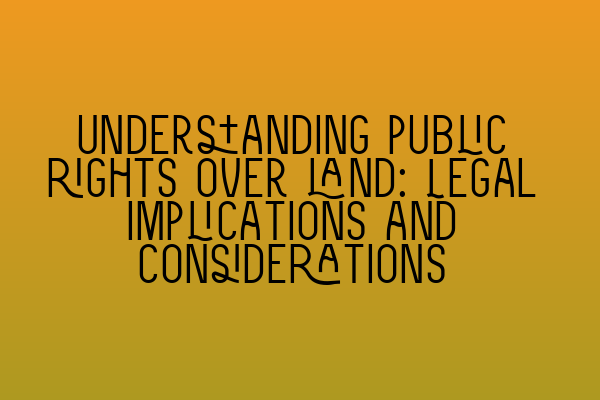Understanding Public Rights Over Land: Legal Implications and Considerations
Introduction:
In today’s blog post, we will delve into the complex topic of public rights over land and explore the legal implications and considerations that arise in relation to these rights. As a solicitor at SQE Property Law & Land Law, it is crucial to have an in-depth understanding of this area to provide effective legal advice to clients. So, let’s dive in and explore this intriguing subject.
1. Definition and Types of Public Rights Over Land:
Public rights over land refer to the rights that individuals or the general public have in relation to using and accessing certain areas of land. These rights are legally recognized and can vary depending on the jurisdiction. Common types of public rights include the right to access public highways, footpaths, common land, and public parks.
To gain a comprehensive understanding of the topic, it is important to explore the nuances of each type of public right. For example, public highways are subject to specific legislation and regulations, while public footpaths may have different rules governing their usage. By delving deeper into the specifics of each type of public right, solicitors can better advise their clients and navigate any legal issues that may arise.
2. Legal Framework and Statutory Provisions:
Public rights over land are typically governed by a combination of legislation, case law, and common law principles. The legal framework can vary across jurisdictions, and it is essential to be aware of the relevant statutes and regulations that apply in a particular area.
For example, in England and Wales, the Highways Act 1980 and the Commons Act 2006 establish the legal framework for public rights over land. Understanding these statutory provisions is crucial for solicitors handling matters related to public rights, such as disputes over public access or rights of way.
3. Assessing Implications for Landowners:
Public rights over land can have significant implications for landowners. It is crucial for solicitors to advise their clients on the potential consequences of such rights and help them navigate any legal challenges that may arise.
For instance, landowners may find themselves subject to restrictions on how they can develop or use their land due to public rights. They may need to ensure that public access to certain areas is maintained, comply with specific regulations for public paths, or obtain necessary permits for events taking place on common land. By understanding the legal implications of public rights, solicitors can guide landowners through these processes effectively.
4. Resolving Disputes and Challenges:
Disputes and challenges relating to public rights over land can be complex and require expert legal representation. When conflicts arise between landowners and the public, solicitors play a crucial role in resolving these matters.
Alternative dispute resolution methods, such as mediation or negotiation, can often be employed to find amicable solutions. However, if a resolution cannot be reached through these means, litigation may be necessary. In such cases, solicitors must possess a deep knowledge of relevant case law and precedents to advocate effectively for their clients’ rights and interests.
Conclusion:
Understanding public rights over land is of utmost importance for solicitors specializing in property law and land law. By comprehending the legal implications and considerations associated with these rights, solicitors can provide effective advice to their clients, resolve disputes, and navigate the complex legal landscape.
To learn more about the legal profession and prepare for the SQE exams, check out our related articles:
– SQE 1 Practice Exam Questions
– SQE 1 Practice Mocks FLK1 FLK2
– SQE 2 Preparation Courses
– SQE 1 Preparation Courses
– SRA SQE Exam Dates
At SQE Property Law & Land Law, we are committed to providing expert advice and support on property law matters. If you require assistance or have any queries, do not hesitate to contact our team of legal professionals.
